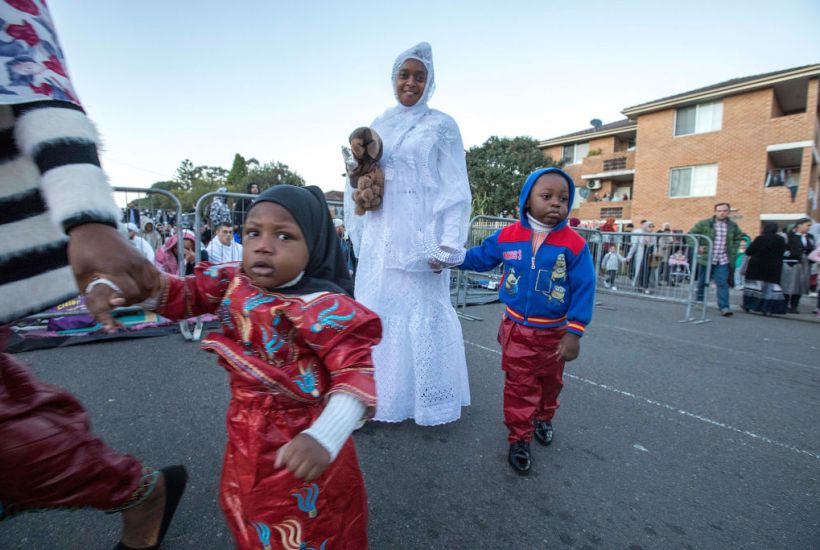With Australia’s population set to hurtle past the 25 million mark in August – decades earlier than predicted – there are renewed calls in Canberra for a significant reduction in the country’s sky-high immigration intake.
Western Australian Senator Dean Smith is the latest Coalition MP to publicly call for a slowdown in immigration, which is presently running in excess of 220,000 a year – one of the largest per capita intakes in the world. The Liberal Senator this week argued for a moderation in the intake to “give ourselves some time to breath” and allow infrastructure to catch up with population growth. Turbo-charged immigration is behind Australia’s extraordinary population growth rate, which is more than double that of the US and UK and nearly nine times the European Union average.
Smith also urged Prime Minister Malcolm Turnbull, Treasurer Scott Morrison and Home Affairs Minister Peter Dutton to support a yearlong Senate inquiry into population policy. “It’s time to give everyday Australians a real voice on the future direction of Australia’s population policy, and I believe a Senate inquiry will deliver a community-backed position,” Smith was quoted as saying.
The Senator has indicated that he is prepared to negotiate with Labor and the Senate crossbench to establish the inquiry if Coalition support does not materialise.
The proposal is likely to find support among some crossbenchers. Pauline Hanson and One Nation have propounded a zero-net immigration policy and are presently pushing for a plebiscite on population numbers. The Australian Conservatives Cory Bernardi has also called for immigration to be slashed. However, securing Labor’s support could prove impossible.
While Labor could use such an inquiry to embarrass the Turnbull Government and create a point of policy difference, the federal party seems averse to any sort of serious public discussion about immigration and population issues. Moreover, as a recent report by sociologist Katharine Betts noted, most Labor politicians strongly support high immigration and the headlong rush towards a ‘Big Australia’, despite the fact that many Labor voters tend to favour a smaller migrant intake.
In fact, both major parties are out of step with public opinion. A series of recent polls have shown growing voter opposition to high immigration and population growth. This is hardly surprising given the pressure this explosion in numbers is placing on nearly everything, from infrastructure, housing and urban amenity to wages, the natural environment and energy and water supplies. These mounting stresses are particularly acute in the fast-growing capital cities, with many established residents experiencing a decline in their living standards.
There is also evidence that high immigration is fraying the country’s social fabric. Citizenship Minister Alan Tudge admitted earlier this year that new migrants weren’t integrating as well as previous waves. A kerfuffle recently erupted in New South Wales when Labor leader Luke Foley drew attention to the phenomenon of “white flight” occurring in Sydney suburbs with heavy concentrations of new arrivals – a trend that has also been observed in other cities. A 2017 survey of public attitudes towards immigration and population found that, in addition to concerns about the impact on roads, transport, hospitals, housing and jobs, a majority of voters believed Australia was in danger of losing its identity and culture and had changed so much that it sometimes felt like a foreign country.
Sydney and Melbourne, which attract the vast bulk of new arrivals, face some of the most pressing challenges. The cities are choking due to congestion and have the most unaffordable housing in the developed world, alongside Hong Kong and Vancouver.
A report released this month by the Australian Population Research Institute concluded that – despite long-standing denials from some in government and industry – immigration is indeed a major contributing factor to the housing affordability crisis in our two largest cities. The unremitting influx of overseas arrivals has created red-hot demand for dwellings, thereby pushing up prices and freezing young Australians out of the market. According to the report’s authors, Bob Birrell and Ernest Healy, around 64 per cent of Sydney’s need for new dwellings each year is due to new migrants, while for Melbourne the figure is around 54 per cent. At the same time, housing costs have skyrocketed and wage growth has stagnated.
One of the reasons Canberra has been so eager to pursue rapid immigration-fuelled population growth is because it inflates headline GDP growth figures, allowing politicians to paint a deceptively rosy picture of the economy. However, the average Australian is no better off economically when measured in per capita terms. As economist and former Productivity Commissioner Judith Sloan has repeatedly pointed out, the economic benefits of immigration are practically non-existent for incumbent residents, with most of the gains being captured by the migrants themselves.
Right across the country, state governments are struggling to provide the public infrastructure and services needed to accommodate the jumbo loads of new residents arriving every week. The vertical fiscal imbalance within Australia’s federal system has left the states without adequate funds to cope with the rapid population surge imposed on them by Canberra, which controls the immigration levers. This has led to unpopular state asset sales and increased debt.
In its 2016 report into the migrant intake, the Productivity Commission recommended that Canberra give greater consideration to the states’ ability to finance and manage infrastructure projects when setting immigration levels. The commission also recommended that the Commonwealth develop and articulate a national population policy designed to “maximise the economic, social and environmental well-being of the Australian community and their future offspring.”
This advice was rejected by the Turnbull government, as was former prime minister Tony Abbott’s call to scale back immigration to protect living standards and social cohesion. The question now is whether Dean Smith’s proposals will be met with the same obstinacy on the part of the Prime Minister and his cabinet colleagues.
E.R. Drabik is a former country journalist and political staffer.
Got something to add? Join the discussion and comment below.
Got something to add? Join the discussion and comment below.
Get 10 issues for just $10
Subscribe to The Spectator Australia today for the next 10 magazine issues, plus full online access, for just $10.


























Comments
Don't miss out
Join the conversation with other Spectator Australia readers. Subscribe to leave a comment.
SUBSCRIBEAlready a subscriber? Log in